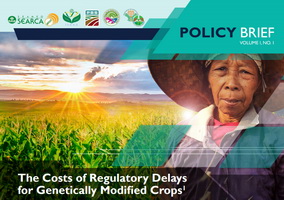
SEARCA-BIC Policy Brief Analyzes the Cost of Regulatory Delays for GM Crops
February 6, 2019| |
 Regulatory approval times for genetically modified (GM) crops are increasing in many countries. The impact of unjustified regulatory delays due to policy inefficiencies, lack of coordination or unnecessary and redundant requirements may particularly affect the public sector and international R&D investments which are intended to address the need for GM crops in developing countries.
Regulatory approval times for genetically modified (GM) crops are increasing in many countries. The impact of unjustified regulatory delays due to policy inefficiencies, lack of coordination or unnecessary and redundant requirements may particularly affect the public sector and international R&D investments which are intended to address the need for GM crops in developing countries.
The first in a series of policy briefs released by the SEARCA Biotechnology Information Center (SEARCA BIC) is based on a study co-authored by Dr. Jose Benjamin Falck Zepeda, a Research Fellow at the International Food Policy and Research Institute (IFPRI) and Policy Team Leader at the Program for Biosafety Systems (PBS). The study sought to analyze the economic impact of regulatory delays for GM crops. By modeling several regulatory delay scenarios, results reveal that longer regulatory delays are associated with higher investment risk which could possibly discourage investments in the development of a GM crop. Findings of the analysis also emphasize the need for regulators, decision-makers, and developers to reduce time delays and increase the efficiency of coordinating decision points along the product development cycle -- for R&D, regulatory review, and compliance to optimize costs and time in delivering a product.
The 2018 Policy Brief series is produced in partnership with the International Service for the Acquisition of Agri-biotech Applications (ISAAA), Coalition for Agriculture Modernization in the Philippines (CAMP), Department of Agriculture-Biotechnology Program Office (DA-BPO), Program for Biosafety Systems (PBS), and DA-Bureau of Agricultural Research (DA-BAR).
For more details, read the full policy brief.
| |
Biotech Updates is a weekly newsletter of ISAAA, a not-for-profit organization. It is distributed for free to over 22,000 subscribers worldwide to inform them about the key developments in biosciences, especially in biotechnology. Your support will help us in our mission to feed the world with knowledge. You can help by donating as little as $10.
-
See more articles:
-
News from Around the World
- FAO: Sustainable Agri Requires an Integrated Approach
- USDA ARS Female Biologist Bags NAS Food And Agricultural Science Prize
- SEARCA-BIC Policy Brief Analyzes the Cost of Regulatory Delays for GM Crops
- Scientists Sequence Genome of Broomcorn Millet
- Substance that Gives Rapeseed a Bitter Taste Has Been Discovered
- Near-complete Genome Sequence of Snapdragon Successfully Assembled
- Research Groups Discover How Plants Cope with Iron Deficiency
-
Research Highlights
- Overexpression of Moss Gene in Cotton Enhances Yield and Fiber Quality
- Biofortified Cassava Shows Higher Levels of Iron
-
Beyond Crop Biotech
- GM Chickens Developed to Lay Anti-cancer Eggs
-
From the BICs
- Communicating Scientific Issues Responsibly
-
Announcements
- Genetic Biocontrol for Invasive Species
-
Plant
- CRISPR-Cas9 System Used to Develop First-Ever Plantain Resistant to Banana Streak Virus
- New CRISPR Database to Catalyze Collaborations
- Agrobacterium-delivered CRISPR-Cas9 System for Genome Editing of Wheat
-
Read the latest: - Biotech Updates (January 21, 2026)
- Gene Editing Supplement (January 28, 2026)
- Gene Drive Supplement (February 22, 2023)
-
Subscribe to BU: - Share
- Tweet
